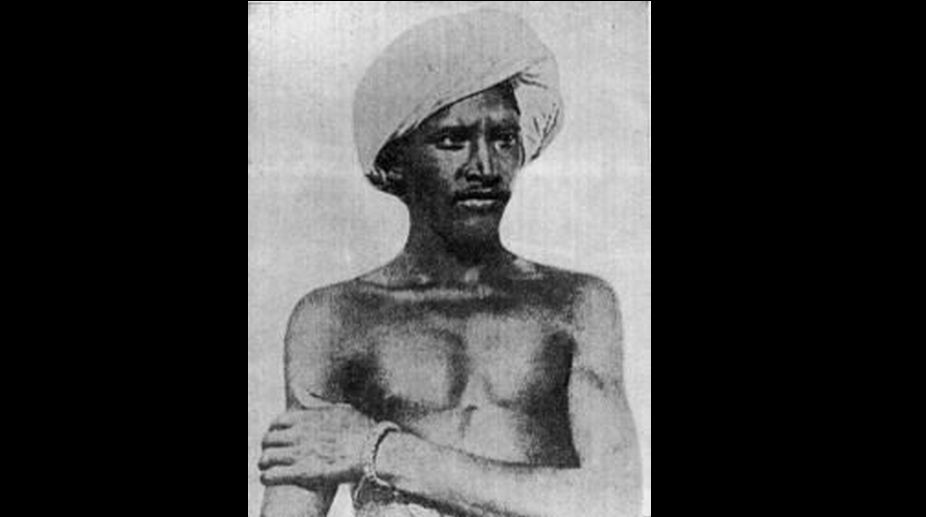PM Modi awarded highest civilian honour of Cyprus
Prime Minister Narendra Modi on Monday received "Grand Cross of the Order of Makarios III”, the highest honour of Cyprus, from President Nikos Christodoulides at the Presidential Palace in Nicosia.
This day not only commemorates Munda on his birth anniversary but also highlights the rich cultural heritage and contributions of tribal communities across India often overlooked in the past.
Statesman News Service | New Delhi | November 14, 2024 3:57 pm

Birsa Munda (Photo: X)
India will observe Janjatiya Gaurav Diwas, a day dedicated to celebrating the legacy of Bhagwan Birsa Munda, a revered tribal leader and freedom fighter, tomorrow.
This day not only commemorates Munda on his birth anniversary but also highlights the rich cultural heritage and contributions of tribal communities across India often overlooked in the past.
Advertisement
It is worth mentioning here that Prime Minister Narendra Modi’s connection with the country’s tribal communities goes beyond policy — it’s personal. And this is evident in his actions, whether he’s sharing tea in a tribal home, celebrating their festivals, or wearing their traditional attire with pride. Unlike previous approaches, his engagement with tribal communities is deeply genuine, bringing their stories, arts, and heroes to the forefront and elevating their contributions to national and international stages. In many ways, he is the first PM to foster such a close, respectful relationship with India’s tribal communities.
Advertisement
The past decade has seen a notable transformation in recognition and celebration of tribal culture. In fact, the PM has amplified the voices of tribal communities across national and global platforms in many ways. By presenting tribal artworks to world leaders, he fosters a global appreciation for India’s tribal cultures, encouraging dialogue and recognition. Among these gifts, Dokra art, known for its intricate metalwork and deep historical roots, has been given to leaders from Australia, Brazil, Cook Islands, and Tonga. Sohrai paintings from Jharkhand were gifted to Russian President Vladimir Putin, and Gond Painting from Madhya Pradesh to Brazilian President, Luiz Inácio Lula da Silva, celebrated for its vibrant colours and intricate patterns.
Recognition of tribal products through Geographical Indication (GI) tags has also gained momentum, with over 75 tribal products now officially tagged. So far this year, several items received GI tags, including the Jaapi, a bamboo hat from Assam; the Dongria Kondh shawl from Odisha; Yak Churpi, a fermented product from Arunachali yak milk; Similipal Kai Chutney, made from red weaver ants in Odisha; and the Bodo Aronai, a traditional woven cloth from the Bodo community. Additionally, over 300 Tribal Heritage Conservation Centers have been established to document, archive, and promote the diverse languages, traditions, and cultural practices of tribal communities.
The PM has honoured Bhagwan Birsa Munda by declaring November 15 as Janjatiya Gaurav Diwas. He also became the first PM to visit Munda’s birthplace in Ulihatu, Jharkhand. The Bhagwan Birsa Munda Memorial Park and Freedom Fighter Museum in Ranchi, featuring a 25-foot statue of Munda and honouring other tribal freedom fighters, underscores this recognition. In celebration of his 150th birth anniversary, a grand statue of Munda will be installed at the Vanvasi Kalyan Ashram in Sri Vijaya Puram, accompanied by a “Gaurav Yatra” carrying the statue across various locations before its final installation.
Since its inception in 2017, the Aadi Mahotsav has promoted tribal entrepreneurship and cultural exchange in various locations across India, with 37 editions held to date. This event has featured over 1,000 tribal artisans and showcased a rich variety of tribal art, artifacts, handicrafts, and cuisine in over 300 stalls. At the G20 Summit, tribal artisans gained even greater international recognition for their work.
The Modi Government has honoured tribal freedom fighters like Birsa Munda, Rani Kamalapati, and Gond Maharani Veer Durgavati. Movements like the Khasi-Garo, Mizo, and Kol uprisings, which shaped India’s history, have also been recognized. Freedom fighter museums are being developed across India, with three already completed: the Bhagwan Birsa Munda Tribal Freedom Fighter Museum in Ranchi, the Raja Shankar Shah Raghunath Shah Museum in Jabalpur, and the Badal Bhoi Tribal Freedom Fighter Museum in Chhindwara.
India’s tribal products are gaining international acclaim. Araku Coffee opened its first organic coffee shop in Paris in 2017, marking its entry into global markets. Similarly, dehydrated Mohua flowers from Chhattisgarh have made their way into international markets, including France. Also, the Tribal Cooperative Marketing Development Federation (TRIFED) has so far empowered over 218,500 artisan families, facilitating the sale of more than 100,000 tribal products through its retail network, Tribes India.
The PM’s commitment to India’s tribal communities is reflected in his efforts to elevate their heritage, preserve their legacy, and integrate their contributions into the national narrative. These initiatives honour the deep cultural roots of tribal communities, empowering them and bringing their voices and stories to the world.
Advertisement
Prime Minister Narendra Modi on Monday received "Grand Cross of the Order of Makarios III”, the highest honour of Cyprus, from President Nikos Christodoulides at the Presidential Palace in Nicosia.
Prime Minister Narendra Modi along with the Cyprus President Nikos Christodoulides on Monday held a Roundtable interaction with business leaders from Cyprus and India in Limassol.
Excitement is rising among the Indian diaspora as Prime Minister Narendra Modi is set to arrive in Canada on Monday for the G7 Summit.
Advertisement
